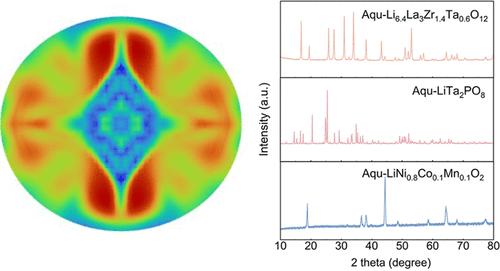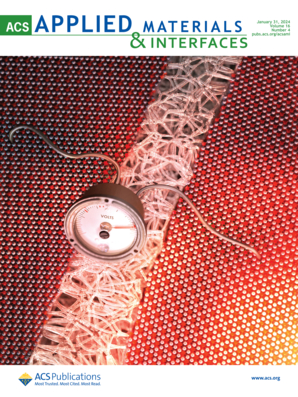沸水辅助固相烧结法清洁合成氧化物电解质
IF 8.2
2区 材料科学
Q1 MATERIALS SCIENCE, MULTIDISCIPLINARY
引用次数: 0
摘要
固相烧结(SS)由于其简单和可扩展性而成为一种广泛使用的氧化物合成方法。然而,它通常依赖有机液体作为研磨介质,导致更高的成本和环境污染。本研究提出了一种沸水辅助固相烧结(BWA-SS)方法来合成氧化物电解质材料,该方法以水作为研磨介质,直接烧结前驱体浆料,提供了一种环保的工艺。更重要的是,有限元分析表明,该方法防止了沸水中蒸汽质量通量梯度引起的原料颗粒二次分散而不均匀沉降。采用这种无有机方法,成功合成了纯Li7La3Zr2O12 (LLZO)固体电解质,离子电导率(σi)达到6.22 × 10-4 S/cm,与传统SS法制备的LLZO固体电解质材料相当。组装的Li/LLZO/Li对称电池在0.1 mA/cm2电流密度下可稳定循环3000 h。该方法还成功地扩展到其他固体电解质(LiTa2PO8, LTPO)和正极材料(LiNi0.8Co0.1Mn0.1O2, NCM811)的合成,显示了清洁制备各种氧化物材料的潜力。本文章由计算机程序翻译,如有差异,请以英文原文为准。

Clean Synthesis of Oxide Electrolytes via a Boiling Water-Assisted Solid-Phase Sintering Route
Solid-phase sintering (SS) is a widely used method for synthesizing oxides due to its simplicity and scalability. However, it typically relies on organic liquids as grinding media, resulting in higher costs and environmental pollution. This study proposes a boiling water-assisted solid-phase sintering (BWA-SS) method for synthesizing oxide electrolyte materials, in which water is used as the grinding medium and the precursor slurry is directly sintered, providing an eco-friendly process. More importantly, finite element analysis shows that this method prevents the uneven sedimentation of raw material particles by secondary dispersion caused by the vapor mass flux gradient in boiling water. Using this organic-free method, the pure Li7La3Zr2O12 (LLZO) solid electrolyte is successfully synthesized, achieving a high ionic conductivity (σi) of 6.22 × 10–4 S/cm, which is comparable to that of LLZO solid electrolyte material produced by the conventional SS method. The assembled Li/LLZO/Li symmetrical cell exhibits stable cycling for 3000 h at a current density of 0.1 mA/cm2. This method has also been successfully extended to the synthesis of other solid electrolytes (LiTa2PO8, LTPO) and cathode materials (LiNi0.8Co0.1Mn0.1O2, NCM811), demonstrating potential for clean preparation of various oxide materials.
求助全文
通过发布文献求助,成功后即可免费获取论文全文。
去求助
来源期刊

ACS Applied Materials & Interfaces
工程技术-材料科学:综合
CiteScore
16.00
自引率
6.30%
发文量
4978
审稿时长
1.8 months
期刊介绍:
ACS Applied Materials & Interfaces is a leading interdisciplinary journal that brings together chemists, engineers, physicists, and biologists to explore the development and utilization of newly-discovered materials and interfacial processes for specific applications. Our journal has experienced remarkable growth since its establishment in 2009, both in terms of the number of articles published and the impact of the research showcased. We are proud to foster a truly global community, with the majority of published articles originating from outside the United States, reflecting the rapid growth of applied research worldwide.
 求助内容:
求助内容: 应助结果提醒方式:
应助结果提醒方式:


